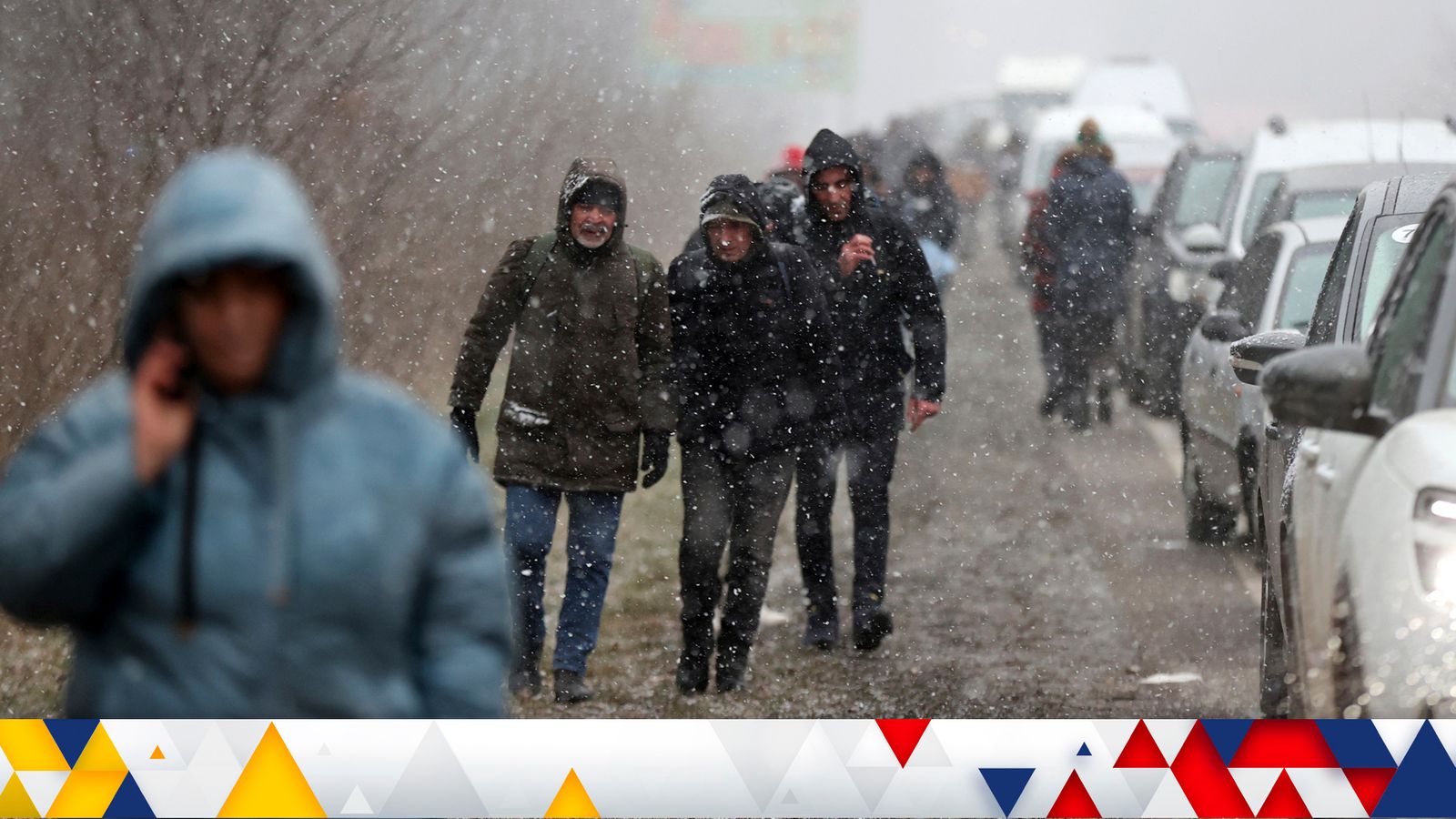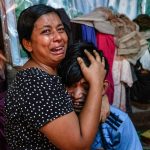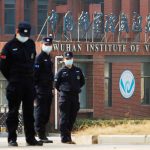Lviv’s train station is big and bold, a landmark in a city that is known for its architecture and now a gateway for those attempting to flee their country.
This is the main station for trains across the border to Poland, and every train that leaves here is full.
But there are also lots of people arriving in this city from across Ukraine, those who want to find sanctuary away from the fighting, but who are not prepared to leave their country.
Igor is cradling his young daughter when we talk, calming her cries and, perhaps, also soothing himself.
He, along with his wife, children, sister and brother-in-law, had just fled Kharkiv.
‘We are being destroyed’: dire warning from major city – follow latest on Ukraine invasion
They had spent four nights in a basement, hiding from explosions.
Ukraine invasion: Seize oligarchs’ UK properties to house refugees, government told
Ukraine invasion: Russian and Belarusian athletes out of Paralympics in stunning U-turn
Ukraine invasion: President Zelenskyy says nearly 9,000 Russian soldiers have died – as Kherson mayor says city has fallen
Then they would spend the day in a flat that was less than a kilometre from the administrative building.
Key developments:
• One million people have now fled Ukraine, says UN refugee commissioner
• A second round of talks between Russia and Ukraine is expected later
• Russia claims 498 of its soldiers have been killed and 1,597 wounded
• Paralympic bosses make U-turn and ban Russian and Belarusian athletes
• Five children among those detained in Moscow for laying flowers at Ukraine embassy
‘Our city is bombed now’
When it was hit by a devastating missile attack, they decided it was time to go.
“We need to leave our city because our city is bombed now. For last two days, the centre of the city and many buildings in our city were bombed. Houses with people in them…” Igor’s voice trails off, but his sister, Anna, carries on.
“There were a lot of dead people because they bombed our houses,” she tells me, angry and lucid.
“They didn’t bomb military objects – they bombed houses. So a lot of children and people are dead.
“Yesterday was a horrible day. We left on a train when there were bombs and rockets. We sat on the train like this,” and she pushes her head down into her neck, and raises her arms over her head – a picture of terror.
Elderly woman to walk to a border crossing
Another woman sat with her elderly mother, watching us broadcast live.
They looked utterly exhausted. I smiled at her and she tried to smile back, and then simply burst into tears, rocking in desperate misery as her mother looked on, helpless.
So I did what anyone would do – I gave her a hug and offered her my cup of coffee. It turned out that mother and daughter had fled Kyiv, terrified.
They were now waiting for a car to take them as near to the border as possible and would walk the rest of the way.
And that is what has happened to Ukraine.
An elderly woman, walking through freezing weather to get to a border crossing in order to flee the country she loves.
Lviv is the barometer
Lviv may be the staging post for people to reach safety, but it is also a barometer of how this country has been encompassed by shock, dread and misery.
The city is normally home to 700,000 people but now Lviv is in flux, with people arriving and departing in great numbers every day.
The square opposite the station looks like a small refugee camp, with people huddling around fires for warmth and volunteers handing out food, soup and water.
Firewood is burnt to power water boilers, creating an acrid smoke that lingers over the area. Just a few metres away, children jump around in a small playground.
The resilience of the Ukrainian people is remarkable, but what really touches you is this – the sight of children laughing and smiling while their parents worry about the ripples of war.
Lviv is playing the role of Ukraine’s backup
Please use Chrome browser for a more accessible video player
Lviv’s traffic grinds along. While cities in eastern and southern Ukraine look deserted, this one can trick you into thinking life is normal.
It turns out that a traffic jam can be a comforting touchstone to normal life. That is until you reach a checkpoint surrounded by homemade anti-tank installations.
Our vehicle was checked by three different people. At the door, a young man stood watching on, his uniform hanging off him.
He looked young – 17 or 18 – and he smiled and waved at us like an excited schoolboy. From his shoulder, an AK-47 hung down.
Follow the Daily podcast on Apple Podcasts, Google Podcasts, Spotify, Spreaker
Ukraine is now full of people who’ve been given a uniform and a gun and told to get on with it.
For the moment, Lviv is a relatively safe city. The air raid sirens go off when they are tested, but nobody here takes them seriously. Not yet anyway, but who really knows what will happen in this ghastly, unpredictable war?
Instead, this is a city with a role as the nation’s backup plan: “Get to Lviv, and things will be better” is the mantra for many.
But as you watch the tears rolling down the faces of tired, scared new arrivals, the optimism feels meagre.






















